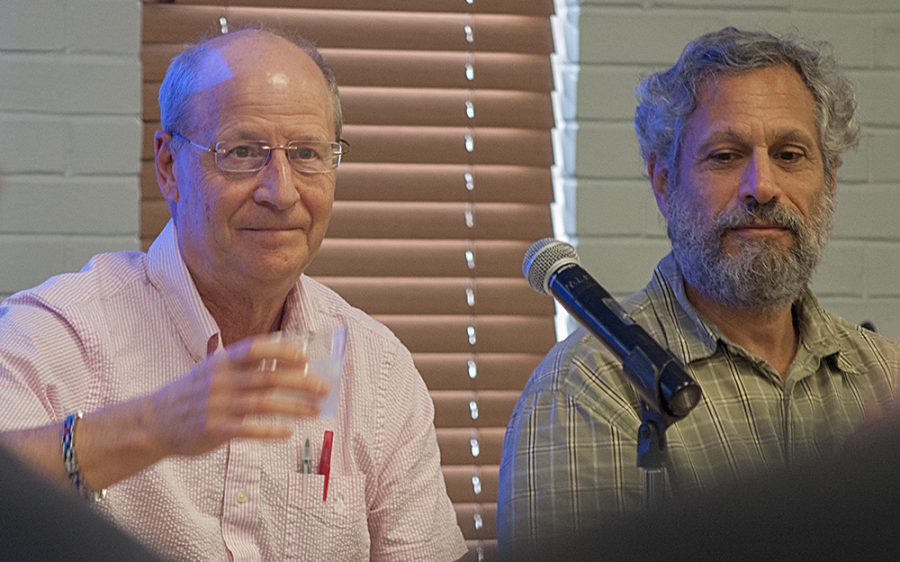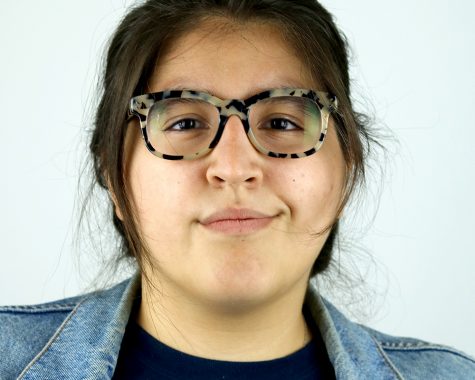Panelists identify importance of liberal education in universities
Philosophy professor Gary Aylesworth (left) lifts his glass for a drink after giving his feedback on the role and importance of a liberal arts education during this semester’s faculty forum in the Charleston/Mattoon room of the Martin Luther King Jr. University Union. Math professor Charles Delman (right), Eastern’s Provost Jay Gatrell and Illinois State’s Provost Jan Murphy were also panelists and offered their input on the topic.
September 6, 2018
Four panelists addressed the importance of a liberal education and the responsibility universities have to promote this type of education Thursday during this semester’s faculty forum at the Martin Luther King Jr. University Union.
Philosophy professor Gary Aylesworth, math professor Charles Delman, Eastern provost Jay Gatrell and Illinois State Provost Jan Murphy were the featured panelists and each gave their own interpretation of a liberal education in universities or what administrators and faculty need to do to support a liberal education.
Aylesworth addressed the history behind a liberal education and said the modern concept of that coincides with the funding of the University of Berlin in 1810 in response to industrialization and the progressive development of modern science.
He said liberal education is to include research and the development of new knowledge in addition to historical learning.
“It is oriented toward the future and is no longer in servitude to the past or to external authorities but serves the state in bringing about modern reforms,” he said.
He said the American land grant university is an extension of this idea.
However, he said now the danger that threatens a liberal education appears in the guise of capitalism and consumerism.
“In the American context the function of the liberal university is in danger of being reduced to serving economic interests exclusively,” he said. “This danger is intensified by political leaders who are themselves enthralled to banking and business interests, by the stagnation of wages of the middle class, by pervasive consumerist attitudes served by politicians, students, parents and I’m sad to say even by (professors).
Therefore, he said in response to this, the liberal university should preserve the benefits of traditional learning.
Delman said the future depends on the kind of education society gives to the next generation. He said what students really need is a “liberating education,” because he does not think the traditional concept or even the evolving concept of a liberal education is really good enough but could be changed and approved.
“A wide exposure to the products of our culture, society and history in itself is not enough to unpack the premises on which (those products) are based,” he said.
He said a liberating education should empower the students and make them think deeper and start to reject the fundamental framework that is typically used to solve problems in any field of learning.
He said students need to engage with what they have written and do more than what they learned from the “condensed Reader’s Digest” version of what they were taught.
“They have to go on a journey, following their interests and delving deeper and deeper so a liberating education would engage students … to develop their passion through continued study and emerge ideas important to them,” Delman said.
He said more needs to be expected from students and the only way this will change will be by changing the culture.
“We really do want to change the world, that we’re not happy with it and the way the world changes is by changing the way people see it and that current views are failing to solve critical problems,” Delman said.
Murphy took a different approach and asked what administrators and faculty need to do to support a liberal education on and off campus.
She said this could be done by hiring faculty for every need on campus, including those in the liberal arts, regardless of how many majors or how many students are enrolled in a program.
“Just because there aren’t a lot of majors in a program, (institutions shouldn’t) shut down that program (because) you loose that sense of what the university is,” she said.
She said everyone involved in a university has a responsibility to educate students, parents, politicians and society on the importance of a liberal education.
“It isn’t just about what career (a student picks) and how much money they make,” she said.
She said this also meant standing up to legislators and telling them that college is not just about finding a career that makes the most money for the student.
“We have a responsibility to be very vocal about the fact that we are universities and we provide a universal education, and when we have legislators who think, ‘maybe not every university needs an English department or a math department or a philosophy department,’ we have to be willing to stand up and say that just cannot be,” she said. “That doesn’t make sense for this state, and our presidents have to be the ones … to tell them that.”
Analicia Haynes can be reached at 581-2812 or [email protected].

















































